 W
WThe Allobroges were an Iron Age Gallic tribe, dwelling between the Rhône river and the Alps mountains during the Roman period.
 W
WThe Ambarri were a Gallic people, dwelling in the modern Ain region.
 W
WThe Ambiani were a Belgic coastal tribe, dwelling in modern Picardy during the La Tène and Roman periods. They are known for their gold coinage.
 W
WThe Andecavi were a Gallic tribe of ancient and early medieval Aremorica.
 W
WThe Aquitanians were a people living in what is now southern Nouvelle-Aquitaine and southwestern Midi-Pyrénées, France, called Gallia Aquitania by the Romans in the region between the Pyrenees, the Atlantic ocean, and the Garonne, present-day southwestern France. Classical authors such as Julius Caesar and Strabo clearly distinguish them from the other peoples of Gaul, and note their similarity to others in the Iberian Peninsula.
 W
WThe Arverni were a Gallic tribe dwelling in the modern Auvergne region during the La Tène and the Roman periods. They were one of the most powerful tribes of ancient Gaul, contesting primacy over the region with the Aedui.
 W
WThe Atrebates were a Belgic tribe of the Iron Age and the Roman period, originally dwelling in the Artois region.
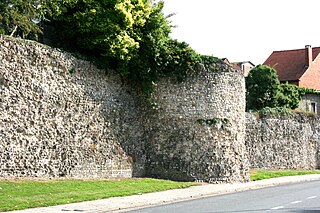 W
WAtuatuca was the name of one or more fortified settlements in the region between the Scheldt and Rhine rivers, during the "Gallic wars" of Julius Caesar. The word itself possibly meant "fortress". The pronunciation "Atuatuca" with a "t" is considered to be the original, despite many Latin documents using a "d". The modern city of Tongeren, referred to as Aduatuca Tungrorum in later Roman imperial times, is at least one of these places, and if there were more places with this same name they were all in the same general region to the north of the Ardennes, and in or near eastern Belgium. At the time, this region was inhabited mainly by the Eburones.
 W
WThe Bellovaci were a Belgic tribe, dwelling in the modern Picardy region, near present-day Beauvais.
 W
WThe Bituriges Cubi were a Gallic tribe dwelling around their oppidum Avaricum. Their territory corresponds to the former province of Berry.
 W
WThe Cenomani or Aulerci Cenomani were a Celtic people, a branch of the Aulerci in Gallia Celtica, whose territory corresponded generally to Maine in the modern départment of Sarthe, west of the Carnutes between the Seine and the Loire. Their chief town was Vindinum or Suindinum, afterwards Civitas Cenomanorum and later Cenomani as in the Notitia Dignitatum, the original name of the town, as usual in the case of Gallic cities, being replaced by that of the people. According to Caesar, they assisted Vercingetorix in the great rising with a force of 5000 men. Under Augustus they formed a civitas stipendiaria of Gallia Lugdunensis, and in the 4th century part of Gallia Lugdunensis III.
 W
WThe Ceutrones were a Gallic tribe of the La Tène and Roman periods. They controlled the Graian Alps regions of Gallia Viennensis Quinta in Gallia Narbonensis.
 W
WThe Condrusi were one of the peoples described by Julius Caesar as Germani Cisrhenani. They survived the Roman invasion and lived in what is now eastern Belgium, during the Roman period.
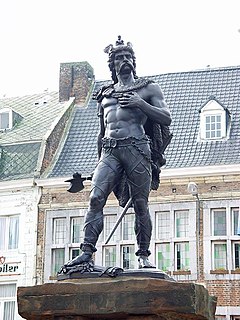 W
WThe Eburones, were a Gallic-Germanic tribe, dwelling in the northeast of Gaul, in what is now the southern Netherlands, eastern Belgium, and the German Rhineland, in the period immediately preceding the Roman conquest of the region. Though living in Gaul, they were also described as being both Belgae and Germani.
 W
WThe Eburovices, Aulerci Eburovices or Eburovici were a Gallic tribe, a branch of the Aulerci. They are mentioned by Julius Caesar with the Lexovii. Pliny speaks of the Aulerci, qui cognominantur Eburovices, et qui Cenomani. Ptolemy makes the Αὐλέρκοι Ἐβουραϊκοί extend from the Ligeris to the Sequana, which is not true. Their chief place was Mediolanum Aulercorum. Their limits correspond to those of the later diocese of Évreux, and they are north of the Carnutes.
 W
WThe Elusates were an Aquitani pre-Roman tribe settled in what today is southwestern France, in the northeast of the Aquitaine territory, around the city of Elusa, which is present-day Eauze, in the French department of Gers. They were subdued by Publius Crassus, legatus of Caesar in 56 BCE.
 W
WThe Helvetii, anglicized as Helvetians, were a Celtic tribe or tribal confederation occupying most of the Swiss plateau at the time of their contact with the Roman Republic in the 1st century BC. According to Julius Caesar, the Helvetians were divided into four subgroups or pagi. Of these Caesar names only the Verbigeni and the Tigurini, while Posidonius mentions the Tigurini and the Tougeni (Τωυγενοί). They feature prominently in the Commentaries on the Gallic War, with their failed migration attempt to southwestern Gaul serving as a catalyst for Caesar's conquest of Gaul.
 W
WThe Helvii were a relatively small Celtic polity west of the Rhône river on the northern border of Gallia Narbonensis. Their territory was roughly equivalent to the Vivarais, in the modern French department of Ardèche. Alba Helviorum was their capital, possibly the Alba Augusta mentioned by Ptolemy, and usually identified with modern-day Alba-la-Romaine. In the 5th century the capital seems to have been moved to Viviers.
 W
WThe Latobrigi were a Celtic tribe mentioned in Julius Caesar's Commentarii. According to Caesar, 14.000 Latobrigi joined the Helvetii in their attempted migration to southwestern France in 58 BC, together with several larger contingents from other tribes. After the defeat at Bibracte, they were ordered to return to their homes and are not mentioned again in the Commentarii.
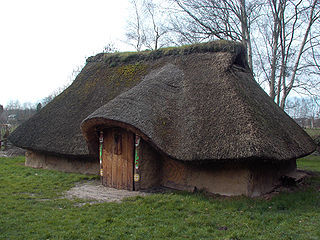 W
WThe Menapii were a Belgic tribe of northern Gaul in pre-Roman and Roman times. According to descriptions in such authors as Strabo, Caesar, Pliny the Elder and Ptolemy their territory had stretched northwards to the mouth of the Rhine in the north, but more lastingly it stretched along the west of the Scheldt river. In later geographical terms this territory corresponds roughly to the modern Belgian coast, the Belgian provinces of East and West Flanders. It also extended into neighbouring France and the river deltas of the Southern Netherlands.
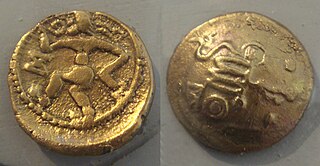 W
WThe Namnetes were a tribe of ancient Gaul, living in the area of the modern city of Nantes near the river Liger.
 W
WThe Nervii were one of the most powerful Belgic tribes of northern Gaul at the time of its conquest by Rome. Their territory corresponds to the central part of modern Belgium, including Brussels, and stretched southwards into French Hainault. During their 1st century BC Roman military campaign, Julius Caesar's contacts among the Remi stated that the Nervii were the most warlike of the Belgae. In times of war, they were known to trek long distances to take part in battles. Being one of the distant northern Belgic tribes, with the Menapii to the west, and the Eburones to their east, they were considered by Caesar to be relatively uncorrupted by civilization.
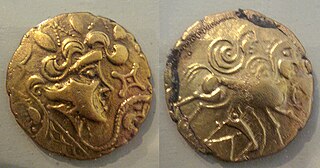 W
WThe Osismii were a Gaulish tribe on the western Armorican peninsula. They were first described as the Ostimioi by the Greek geographer and traveller Pytheas in the fourth century BC.
 W
WThe Parisii were a Gaulish tribe, dwelling on the banks of the river Seine during the Iron Age, from the middle of the 3rd century BC until the Roman era.
 W
WThe Pictones were a Gallic tribe of the La Tène and Roman periods, dwelling south of the Loire river, in the modern départements of Vendée, Deux-Sèvres and Vienne.
 W
WThe Remi were a Belgic tribe, dwelling in the Aisne, Vesle and Suippe river valleys, corresponding to the modern Marne and Ardennes and parts of the modern Aisne and Meuse départements.
 W
WThe Riedones were a Gallic tribe, dwelling around their capital Condate. Caesar mentions the Redones among the civitates maritimae or Aremoricae.
 W
WThe Ruteni were a Gallic tribe of the La Tène and Roman period, dwelling in the modern region of Aveyron. They were known as producers of lead.
 W
WThe Santones or Santoni were a Gallic tribe, dwelling in the area of the modern city of Saintes in what was later organized and named as the province of Saintonge. The Romans occupied the territory of the Santones from the 1st century BC.
 W
WThe Segusiavi were a Gallic tribe around the modern city of Feurs.
 W
WThe Sequani were a Gallic tribe, dwelling in the upper river basin of the Arar river (Saône), the valley of the Doubs and the Jura Mountains. Their territory corresponded to Franche-Comté and part of Burgundy.
 W
WThe Suessiones were a Belgic tribe, dwelling in the modern Aisne and Oise regions during the La Tène and Roman periods.
 W
WThe Tulingi were a small tribe closely allied to the Celtic Helvetii in the time of Julius Caesar's conquest of Gaul. Their location is unknown; their language and descent are uncertain. From their close cooperation with the Helvetii it can be deduced that they were probably neighbours of the latter. At the Battle of Bibracte in 58 BCE, they were, with the Boii and a few other smaller tribes, allies of the Helvetii against the Roman legions of Caesar.
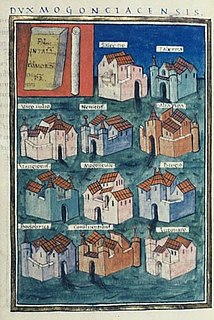 W
WThe Vangiones appear first in history as an ancient Germanic tribe of unknown provenance. They threw in their lot with Ariovistus in his bid of 58 BC to invade Gaul through the Doubs river valley and lost to Julius Caesar in a battle probably near Belfort. After some Celts evacuated the region in fear of the Suebi, the Vangiones, who had made a Roman peace, were allowed to settle among the Mediomatrici in northern Alsace.. They gradually assumed control of the Celtic city of Burbetomagus, later Worms.
 W
WThe Veneti were a Gallic tribe who lived in Armorica.
 W
WThe Viromandui or Veromandui were a Belgic tribe of the La Tène and Roman periods, dwelling in the modern Vermandois region (Picardy).